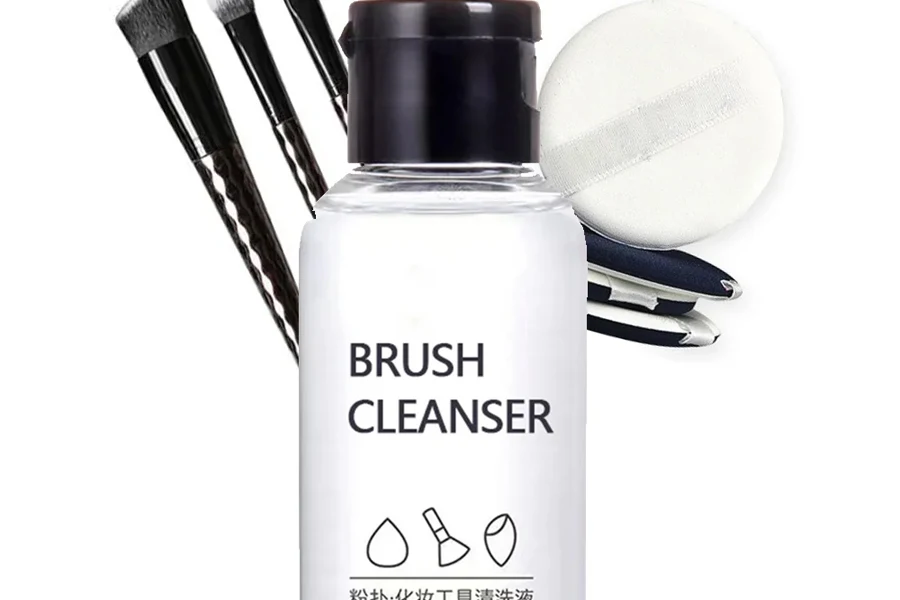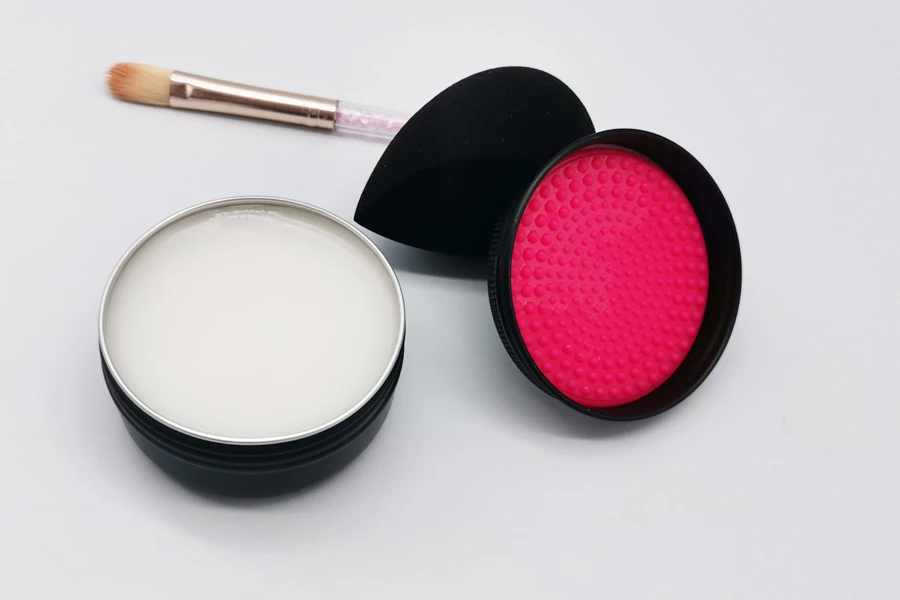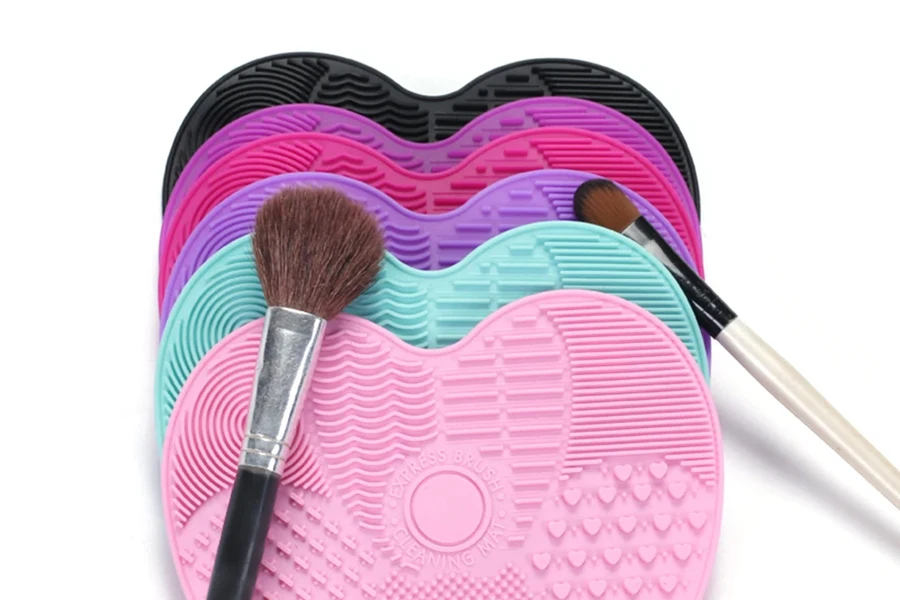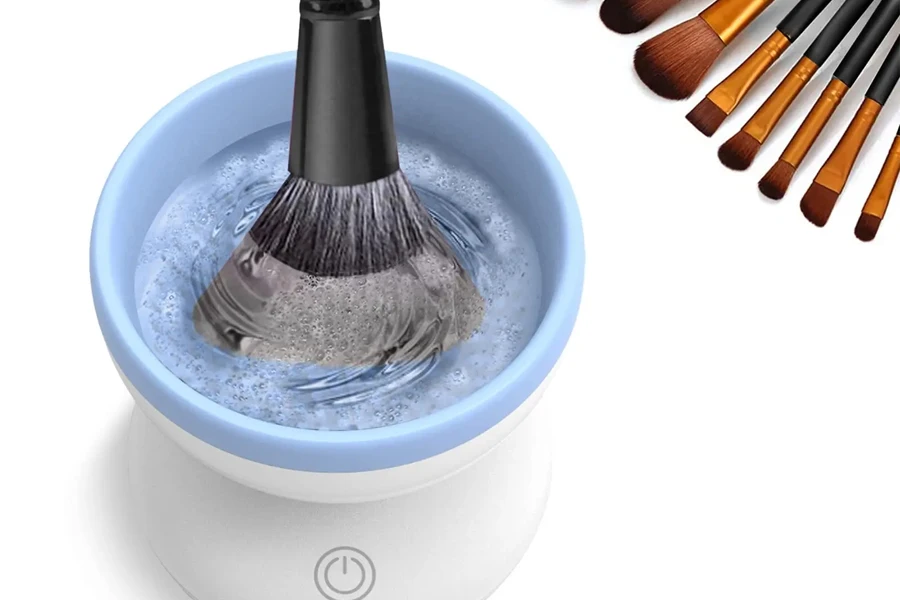Makeup brushes are the best way to apply most cosmetic products. However, using them always leaves some residue on their bristles that must be cleaned before the next use.
Failing to clean them can introduce bacteria and other impurities to the user’s face, leading to unnecessary breakouts and potential skin reactions. However, consumers can avoid all these mishaps by using makeup brush cleaners.
Keep reading to learn more about these helpful tools and how to select the ones that are set to sell well in 2024.
Table of Contents
What are the types of makeup brush cleaners
Things to consider when choosing makeup brush cleaners in 2024
The bottom line
What are the types of makeup brush cleaners
Liquid brush cleaners

Manufacturers specifically design these products to cleanse makeup brushes while maintaining their delicate bristles. Their formulas are great for dissolving and removing accumulated stubborn makeup residue, dirt, and impurities.
Liquid brush cleaners typically come in bottles with pump dispensers or nozzles, making them incredibly easy to use. Some formulas require rinsing with water after gently massaging the brush with the cleaner, while others boast easier no-rinse applications.
Regardless, these cleaners are a convenient and effective way to maintain brush cleanliness and longevity. Consumers can rest assured they’ll get a flawless makeup application on their next use without compromising their skin’s hygiene.
Solid brush cleaner

Liquid brush cleaners require gently massaging makeup brushes to remove the dirt, but not all consumers see them as convenient. Thankfully, they have solid brush cleansers as an alternative.
Solid makeup brush cleaners offer an easier and more effective way to target those pesky bacteria. Typically, manufacturers make them from soap blocks or wax before infusing them with antibacterial agents.
But how are solid brush cleaners more convenient than their liquid counterparts? Consumers also need to wet their brushes and swirl them around the soap or wax until they’re clean—no need for any massaging action.
These brush cleaners are also incredibly portable, offering a quick and easy way to clean makeup brushes on the go. However, they’re more expensive than liquid brush cleaners.
Brush cleaning mats

Sometimes, makeup brushes need a deeper clean than what liquid or solid cleaners can offer. For example, having foundation dry on brushes can be a thorn in the ass for consumers trying to wash them out. That’s where brush cleaning mats come in.
These products offer an impressive way to clean tough and stubborn makeup from brushes in record time. Brush cleaning mats often come with various grooves, ridges, and patterns to make the cleaning process hassle-free.
Consumers only need to swirl their makeup brushes on the mat (like on solid cleaners) to reach deep into the makeup’s bristles. Some cleaning mats have dedicated sections, like “rinse face brushes” and “clean face brushes.”
Although they still need liquid solutions to get that cleaning lather, they can greatly cut cleaning time: highlighters, concealers, eyeshadows, blushes—there’s nothing these tools can’t handle.
Electric brush cleaners

While all these brush cleaners are great, they involve some manual effort. Electric brush cleaners completely automate the brush cleaning process, with many even cutting down drying time.
Consumers can forget about spending time under the sink to clean makeup brushes. These tools can clean and dry makeup brushes in less than a minute! The best part is electric brush cleaners can do all these with the push of a button.
However, consumers must use the appropriate rubber collars for these tools to get maximum effect. Luckily, most electric brush cleaners come with multiple collars, boasting up to 95% compatibility with all brushes on the market.
Natural brush cleaners
The go-green trend extends its influence to various markets, and brush cleaners are not exempt. Natural brush cleaners are eco-friendly alternatives to soaps and liquid cleaners, usually involving ingredients like coconut oil, olive oil, or Castile soap.
Natural brush cleaners also involve mixing these ingredients to achieve the perfect cleaner. They give consumers more DIY power to choose the solution they want. Here are some popular combos:
- Baking soda and water
- Tea tree oil and water
- Vinegar and water
- Olive oil and dish soap
Things to consider when choosing makeup brush cleaners in 2024
Ingredients
It’s easy for things to go wrong with makeup brush cleaners. Consumers may reduce their brush’s lifespan or see their bristles falling out and panic. That’s why businesses must prioritize cleaners with gentle and effective ingredients.
It’s best to avoid cleaners with harsh chemicals as they can wreak havoc on brush bristles over time. Instead, look for mild surfactants, plant-based extracts, and conditioning agents. They’re excellent choices for removing makeup residues and maintaining brush softness and suppleness.
Brush bristle type
Businesses must also consider the brush bristle type they’re targeting. Usually, bristles can either be natural or synthetic, each requiring different formulas for maximum effectiveness.
Natural bristles, often sourced from animal hair, will benefit from cleaners with conditioning agents to keep them soft and prevent them from becoming brittle.
It’s not the same for their synthetic variants. These bristles come from man-made materials, so they’ll respond well to formulas designed to remove product buildup without compromising their structure.
Antibacterial properties
One of the main reasons women get makeup brush cleaners is to eliminate anything that would irritate their skin or cause unwanted breakouts. Unfortunately, makeup brush cleaners can’t do that if they don’t have antibacterial properties.
For this reason, businesses must look for options with antibacterial or antimicrobial properties to safeguard the user’s skin. These antibacterial or antimicrobial components will eliminate any stubborn bacteria, preventing any skin issues, breakouts, or other dermatological concerns.
Moreover, these antibacterial/antimicrobial properties also help extend brush lifespan. They’ll stop harmful microbes from compromising brush bristles, safeguarding the makeup brush’s performance.
Scent
In addition to the makeup brush cleaner’s cleaning properties, businesses must also watch out for its scent. Remember that everyone reacts differently to aromas, and makeup brush cleaners are not exempt. However, choosing scented cleaners or not depends on preference.
Some consumers prefer neutral and fragrance-free makeup brush cleaners. They’re particularly appealing to consumers with sensitive noses or skin, as they cut down the risks of potential allergic reactions or skin irritations certain scents can trigger.
Contrarily, other consumers may appreciate a touch of fragrance. So, retailers can opt for a cleaner infused with light, pleasant scents, adding a subtle, enjoyable aroma to the brush-cleaning process. These fragrances can range from floral and citrus notes to more nuanced and neutral undertones.
Residue-free
Would the cleaner leave brushes residue-free? That’s the big question that determines whether consumers will purchase these products or not. Residues from low-quality cleaners can cause undesirable effects, especially with makeup application and skin health.
Always prioritize residue-free, high-quality brush cleaners to keep everything smooth and safe for consumers. Makeup brush removers should effectively remove all traces of makeup, oils, and impurities from bristles, not add more problems.
The bottom line
The makeup application process is not complete without cleaning the brushes. Previously, it was a tricky, time-consuming task that depended on the type of makeup products. But now, makeup brush cleaners can handle everything from oily cosmetics to water-based products.
Businesses can invest in liquid or solid brush cleaners for consumers who prefer conventional methods. Or, they can stock electric cleaners and brush cleaning mats for ladies who prioritize time and convenience. Natural makeup brush cleaners, on the other hand, are for eco-friendly buyers.
But before choosing any of these cleaners, remember to consider their ingredients, bristle compatibility, scent, residue-free nature, and antibacterial properties.




